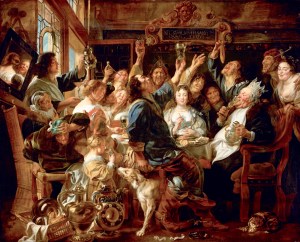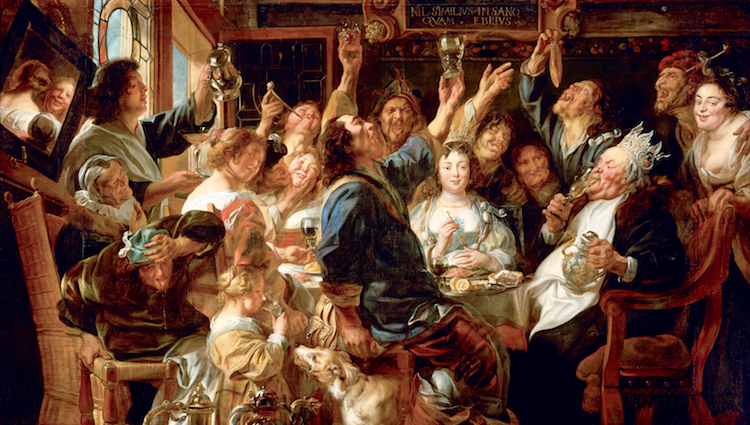Just as Easter joy must animate the rigors of Lent, so too must the spirit of the desert and the Cross ground my celebration of Easter.
 To see a World in a Grain of Sand
To see a World in a Grain of Sand
And a Heaven in a Wild Flower
Hold Infinity in the palm of your hand
And Eternity in an hour
—William Blake, from “Auguries of Innocence”
The end is here! No, this is not another Covid-19 essay, and if you’ve read any of my essays on that topic, you will know I’m in the anti-apocalypse camp.[1] Instead, I write as the end of Lent is here for Western Christians and almost here (April 19) for Eastern Christians. The time of feasting is coming and has come. It is not the same this year, given the lockdowns that forbid us to frolic freely. No large-scale Easter egg hunts for the children. No big parties with friends. My attendance at an Easter Vigil liturgy was not in a pew but in a van parked in a parish parking lot as the priest celebrated under a canopy by the church building. He celebrated the Good Friday liturgy in the back of a U-Haul through the snow and wind. I liked the U-Haul insofar as it emphasized that every Christian liturgy is a foretaste of the final journey back into the heart of a loving Father and also a Cannonball Run-type echo of the first Passover eaten while standing: The Lord be with you! Start your engines.
Despite the differences in manner of group celebrations, my anxiety remains the same. Even with a socially-distanced Easter I worry that the season of the Resurrection will be worse than Lent. The end is here for my self-imposed penances that, however difficult or easy they may be, provide a much stronger sense of discipline than I can muster up for ordinary life.
Once I had discovered the spirituality of Lent in early adulthood, I really liked it. The whole idea of spiritual sacrifice of things that are appealing to us in order to seek the One who gave them to us and then rediscover their goodness anew was one that appealed to me. In a world in which, even mid-lockdown, many of us still have more goods than we know what to do with, it is all too easy to lapse into an easy and uncomprehending acceptance of those goods as normal and therefore uninteresting. We are victims of the “first-world” problem of looking marvels in the eye and responding, “Meh.”
And yet who can tell the greatness and glory of a Kit-Kat bar? What bard has the skill to do justice to even an ordinary cheeseburger? What Swedish bikini team can even hope to depict the thrill involved in beer, which the poet Homer has declared to be both the cause and solution to all our problems.[2]
Many people look askance at marketers with their ads depicting mouthwatering appetizers and the delight that is promised with them. They disdain the promise of deodorant that will bring one confidence, confidence dry and secure, such that the sure may, like the saved, raise their hands anew. They spit on the possibility that a sports utility vehicle will indeed bring ultimate adventure.
I am one of these askance-looking, disdainful spitters. But my problem is not that I think the ads themselves false. No, the problem is that the truth involved in them is too grand for a 90-second spot. “The world will never starve for want of wonders,” Chesterton wrote, but “only for the want of wonder.”
Lent provides that to me. I have very few habits. I look longingly at smokers dedicated to their addiction, not for the increased cancer risk, but for the commitment. Neither snow nor rain nor heat nor gloom of night keeps these addicts from their appointed smoke breaks. But I do, when I get to Lenten times, discover how much I value certain mostly culinary goods that can be given up—milk in my coffee, beef jerky, cottage cheese heaped on a Wheat thin, a bowl of ice cream when the kids are in bed, a beach of salt around a margarita glass. I also discover through an examination of conscience how much I am tempted to overdo them when they are around. It is not for nothing that the only nickname I’ve ever really had was “The Human Garbage Disposal.” Though one uncle had and has his own appellation for me: “The Gorger.”
A period of giving up various kinds of food holds out the promise that I will indeed attain consciousness of the divine image in fried chicken and cookie dough ice cream and also indulge them in a way that befits icons and not idols, while also keeping at bay the heart disease running through parts of my family history.
What is wonderful, I discovered early on, is that Lent does this. For God and my immortal soul I can indeed give up the sacred rites of St. Slim Jim and St. Jameson the Lesser (the martyr duo known to us as Two Gingers is even Greater). This six-week detour from my usual haphazard looking for self-love in all the wrong doses usually results in a healthier, svelte-er me, longing for beef and beer, but happy to rediscover that verily God art a hidden God hiding in, of all ridiculous places, vegetables and hummus. Without my gustatory obsessions I find myself obeying the words of Innocent Smith in Chesterton’s masterpiece Manalive: “Open your eyes; and you will wake up in the New Jerusalem.”
This Lent I found to my amazement that a new laundry detergent can have a scent that may not rise to heaven but raises my jaded nostrils and heart to the one whose vesture is “shining, exceedingly white, like snow, such as no launderer on earth can whiten them” (Mark 9:3, KJV). Not only is my vision clearer, but I find that on Sundays, when, because of its status as a “little Easter,” Western Christians put aside their penances, I can eat some bacon, the recipe for which Hilaire Belloc informs us was given to our first parents in Eden, without going whole hog.
The vision and discipline permeate the newfound joy of Easter. I am on Easter Monday a man of moderation, one who now drinks like the good soldiers chosen by Gideon, with head up, aware of danger, ready still for spiritual combat (See Judges 7).
Give me a week or so, however, and I am starting to lapse back into my old ways. Not only can’t I see a world in a bucket of chicken, I can’t even see Colonel Sanders, having planted myself firmly in the bottom of said bucket. Corona sanitation warnings or no, I will lick my fingers, darn it. It’s not just a slogan they have. It’s science.
Hence my fear. The end is here!
So what am I to do to retain this heavenly vision? I have come to the conclusion that the answer is simple. Just as Easter joy must animate the rigors of Lent, so too must that spirit of the desert and the Cross ground my celebration of Easter. While Eastern and Western authorities maintain that there is no strict fasting in Easter, it seems to me that the three main components of Lent—prayer, fasting, and almsgiving—are three strands of a cord that can never be broken in this life.
“Wait a minute!” said Anonymous Younger Deavel after I announced we’d pray the glorious mysteries of the Rosary on the way back from Drive-in Easter Vigil. “Is this whole-family Rosary thing the new normal? Lent is done.” Ah, dear offspring, you can bet that it is the new normal. Some of the disciplines concerning prayer adopted during Lent will continue. So, too, with the other parts. St. Francis of Assisi himself said that the walls should be strung with bacon during Eastertide. He did not propose to eat it all at once. Nor did he ditch the sackcloth for Saks Fifth Avenue or cease giving to the poor. The bacon was to be shared with the poor and extra clothes, even winter ones, could still be donated to them. After all, even if he hadn’t read his T.S. Eliot, he’s surely met him by now and heard that “April is the cruelest month.” (Easter Monday Minnesota weather report: snowy and cold. Ho, ho, ho. Merry Pascha!) The almsgiving will continue, and now if possible it should be perhaps greater given the Easter joy that motivates it and the vast numbers of unemployed.
The Lord is risen indeed. He reigns now in Heaven and serves as high priest of a new and better covenant (see Hebrews 8-9). He offers what he offered on earth, his whole self—body, blood, soul, and divinity. Now, however, he offers it in a new manner, for death is conquered. But what he offers in Heaven, a living body, is made available under the guise of bread and wine to us. Christians eat of immortality under the sign of death: of body and blood separated. This is a reminder that is very important. While we experience his Resurrection, it is both fullness and a foretaste. To be capable of experiencing the full banquet, we will need to continue to carry a cross to the end of our earthly journeys.
The end is here! I will rejoice and continue to look for the Cross in the midst of my joy—not just the many difficulties put upon me but opportunities to voluntarily die to self amid abundance. It is assured that if I open my eyes and see that, I will indeed see the New Jerusalem beckoning.
Would you like that last thigh? I am satisfied. No, I won’t stop licking my fingers.
This essay was first published here in April 2020.
The Imaginative Conservative applies the principle of appreciation to the discussion of culture and politics—we approach dialogue with magnanimity rather than with mere civility. Will you help us remain a refreshing oasis in the increasingly contentious arena of modern discourse? Please consider donating now.
Notes:
[1] See “Conservative Skepticism and the Pandemic” and also “For the Sake of Its Health, Let’s Get This Country Moving!” in The Imaginative Conservative.
[2] Simpson, Homer Simpson. To whom did you think I was referring?
The featured image is “The Feast of the Bean King by Jacob Jordaens” (between 1640 and 1645) and is in the public domain, courtesy of Wikimedia Commons.


